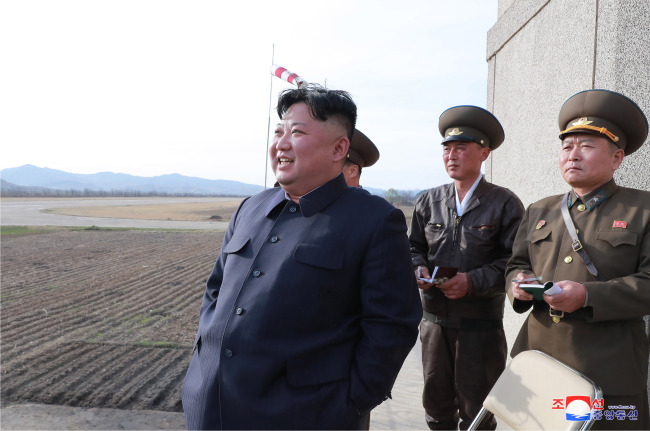President Moon Jae-in has called for another inter-Korean meeting in his ongoing efforts to be a mediator in denuclearization talks between North Korea and the US, but the task may have become tougher, according to experts.
Unlike previous occasions where Seoul mediated US-North Korea talks, Seoul now faces a situation where summit talks between the two countries have failed to produce an agreement and there are signs of North Korea deviating from its denuclearization pledge.
Satellite imagery released by the Center for Strategic and International Studies indicates the movement of radioactive material at Yongbyon, North Korea’s main nuclear site. The imagery, from April 12, shows five specialized railcars near the uranium enrichment facility and the radiochemistry laboratory -- which, according to CSIS, are associated with the movement of radioactive materials or reprocessing campaigns.
But Moon remains firm in his determination to engage North Korea.
“Now is the time to prepare and push for an inter-Korean summit,” Moon said in his weekly meeting with senior aides on Monday. Denuclearization talks and other matters related to the Korean Peninsula and the peace process have entered the phase of building on the foundation laid over the past year, he added, and preparations are needed to reap concrete results.
At Monday’s meeting, Moon also said both US President Donald Trump and North Korean leader Kim Jong-un have expressed willingness to continue the dialogue.
“Our government will take the lead in substantially resolving the North Korean nuclear issue and sustainable peace process on the peninsula,” Unification Minister Kim Yeon-chul said at a forum on Wednesday, reiterating that the South Korean government is in the “driver’s seat.”
Since the North Korea dialogue began, Moon has taken on the role of a mediator, rather than a driver, and his meetings with Kim and US officials have served as steppingstones for US-North Korea dialogue.
Discussions on the first US-North Korea summit began in the wake of the first Moon-Kim summit last April. When Trump called off the meeting in late May last year, Moon met Kim on the North’s side of the truce village of Panmunjom on May 26.
The following day, the US and North Korea began working-level talks for the first Trump-Kim summit, which took place June 12 in Singapore.
Toward the end of last year, US-North Korea relations appeared to sour, with a meeting between Secretary of State Mike Pompeo and North Korea’s top nuclear negotiator, Kim Yong-chol, being canceled in early November. On Nov. 30, Moon met with Trump on the sidelines of the G-20 summit, and the next day Trump revealed that his second meeting with Kim was in the works.
Kim and Trump met for the second time in Hanoi at the end of February, but the summit ended without an agreement.
With denuclearization talks appearing to run aground, Moon met Trump last week in Washington, following which Seoul officials revealed plans to arrange a fourth inter-Korean summit in the near future.
While Kim did express willingness to meet Trump for a third time in Friday’s speech, the North Korean leader also conveyed dissatisfaction with Seoul, fanning speculation that Moon faces a tougher task as a mediator.
In the speech, Kim said Seoul’s policy of depending on foreign powers must be ended, and that all other matters should be secondary to improving inter-Korean relations -- effectively accusing Seoul of failing to follow through on the inter-Korean agreements.
“(South Korea) should not be playing the role of meddlesome mediator, facilitator, but must become a directly involved party that defends the good of the people as a member of the race,” Kim said.
“North and South, and all (Korean) people overseas must resist and break the US and South Korean conservatives’ scheme to challenge the historic movement for peaceful unification.”
Kim also called on the South Korean government to take action to show its sincere commitment to improving inter-Korean relations.
The North Korean leader also accused the US of provoking Pyongyang and threatened to respond in kind to any “hostile policies.”
Some experts say Kim’s speech carried a more fundamental demand that goes beyond dissatisfaction about inter-Korean relations, and Seoul’s role in mediating.
“The message is very clear. (To resolve the matter between) the Korean people, this means setting the US aside, but why (is Moon) assessing both the North Korean and US positions?” Konyang University professor emeritus Kim Tae-woo, former head of the Korea Institute for National Unification, said.
He added that Kim’s message to Seoul is to stop mediating with the US, and that North Korea’s dissatisfaction with Seoul’s mediation is clear.
“The current situation is textbook Finlandization. By attempting to mediate between the US and the North, (Seoul) has lost the trust of both sides, and is now being pressured on two sides.”
North Korea, meanwhile, appears to be seeking to strengthen cooperation with its traditional allies China and Russia.
Pyongyang’s relations with Beijing have shown signs of significant improvement since early last year. Kim has visited China four times since March and has also met with Chinese President Xi Jinping.
The two countries have also opened a monthlong exhibition to mark the first anniversary of Kim’s first official visit to China and 70 years of China-North Korea relations in Beijing.
In addition, Pyongyang is reportedly working with Moscow to arrange Kim’s first summit with President Vladimir Putin.
By Choi He-suk (
cheesuk@heraldcorp.com)








